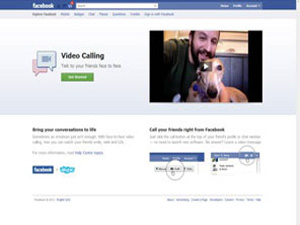



Date:13/07/11
 Facebook has revamped its popular chat feature by adding free video calling that can be launched inside the social network's website. What was most striking about the launch event, held in Palo Alto, was how much CEO Mark Zuckerberg tried to distance his company from those seeking to slow its momentum, Google in particular.
Facebook has revamped its popular chat feature by adding free video calling that can be launched inside the social network's website. What was most striking about the launch event, held in Palo Alto, was how much CEO Mark Zuckerberg tried to distance his company from those seeking to slow its momentum, Google in particular.
The video-calling service is provided in partnership with Skype, which recently agreed to be sold to Microsoft, a Facebook partner and investor. Skype already provides Internet phone and video services, but users need to install a sizable program, and can only make video calls to other Skype members. With the new service, Facebook members can click on a "call" button on a friend's profile page or in a chat window and connect, after installing a small software plug-in. "It's a total natural for them," says Greg Sterling, founding principal of market research company Sterling Market Intelligence. "A lot of people will use it." At the same time, the launch, which included a new group text chat feature and an easy-to-access chat buddy list, appears to expose Facebook's increasing trepidation about Google. Last week, the search giant introduced a preliminary version of its Google+ social network. The new service, yet to be rolled out widely, has garnered considerable positive reaction from early users, though it remains to be seen whether it will take off once it's released more widely. "Now it really looks like Facebook is nervous about Google," says Danny Sullivan, editor in chief of the website Search Engine Land.
Among Google+'s features, in particular, is a group video chat service called Hangouts. Facebook's Skype service is strictly one-to-one calling, which Skype CEO Tony Bates implied make up the vast majority of video calls. But group video calls are also something Skype charges money for, and Zuckerberg brushed away questions on when group video chat might come to Facebook.
One-to-one video calls fit more neatly with Facebook's emphasis on providing ways for people to connect with real-world friends. Other social services such as Twitter and Google+, allow for less personal relationships. "Google's design approach emphasizes loose connections, while Facebook emphasizes closer, more intimate connections," says Ray Valdes, a research director with Gartner Research.
Facebook Lets Its 750 Million Users Video Chat, but Not in Groups
 Facebook has revamped its popular chat feature by adding free video calling that can be launched inside the social network's website. What was most striking about the launch event, held in Palo Alto, was how much CEO Mark Zuckerberg tried to distance his company from those seeking to slow its momentum, Google in particular.
Facebook has revamped its popular chat feature by adding free video calling that can be launched inside the social network's website. What was most striking about the launch event, held in Palo Alto, was how much CEO Mark Zuckerberg tried to distance his company from those seeking to slow its momentum, Google in particular.The video-calling service is provided in partnership with Skype, which recently agreed to be sold to Microsoft, a Facebook partner and investor. Skype already provides Internet phone and video services, but users need to install a sizable program, and can only make video calls to other Skype members. With the new service, Facebook members can click on a "call" button on a friend's profile page or in a chat window and connect, after installing a small software plug-in. "It's a total natural for them," says Greg Sterling, founding principal of market research company Sterling Market Intelligence. "A lot of people will use it." At the same time, the launch, which included a new group text chat feature and an easy-to-access chat buddy list, appears to expose Facebook's increasing trepidation about Google. Last week, the search giant introduced a preliminary version of its Google+ social network. The new service, yet to be rolled out widely, has garnered considerable positive reaction from early users, though it remains to be seen whether it will take off once it's released more widely. "Now it really looks like Facebook is nervous about Google," says Danny Sullivan, editor in chief of the website Search Engine Land.
Among Google+'s features, in particular, is a group video chat service called Hangouts. Facebook's Skype service is strictly one-to-one calling, which Skype CEO Tony Bates implied make up the vast majority of video calls. But group video calls are also something Skype charges money for, and Zuckerberg brushed away questions on when group video chat might come to Facebook.
One-to-one video calls fit more neatly with Facebook's emphasis on providing ways for people to connect with real-world friends. Other social services such as Twitter and Google+, allow for less personal relationships. "Google's design approach emphasizes loose connections, while Facebook emphasizes closer, more intimate connections," says Ray Valdes, a research director with Gartner Research.
Views: 844
©ictnews.az. All rights reserved.Similar news
- 24% of U.S. Adults have made phone calls on the Internet
- UNESCO puts sustainable learning online
- Australia gives incentives for the use of telehealth
- US launches computer programme for poor kids
- UN declares web access as human right
- Facebook growth slows in stalkerbase heartlands
- One Third of Millionaires Use Social Media
- Facebook Seeks Bigger Role in Software for Mobile Apps
- Icann increases web domain suffixes
- IBM launches new social networking platform for enterprises
- Google Notches One Billion Unique Visitors Per Month
- Internet providers cut international channel renting costs by 60%
- Azerbaijan launches standard time on internet
- Icann launches facility to ease DNSSec adoption
- Social network data mining yields worrying results for traditional media





















